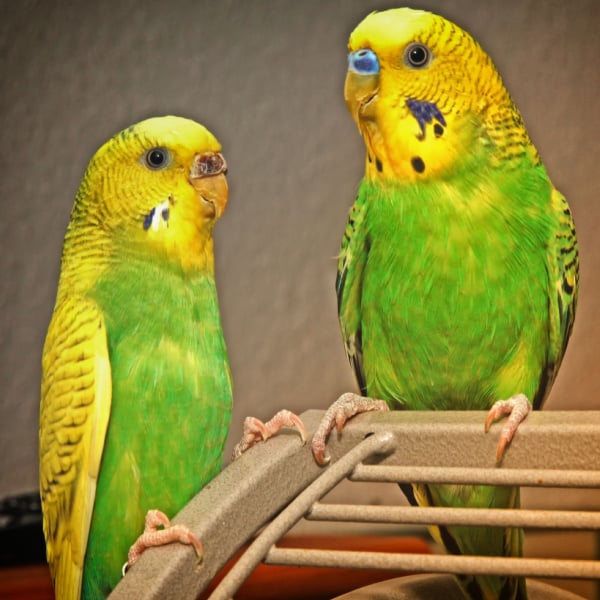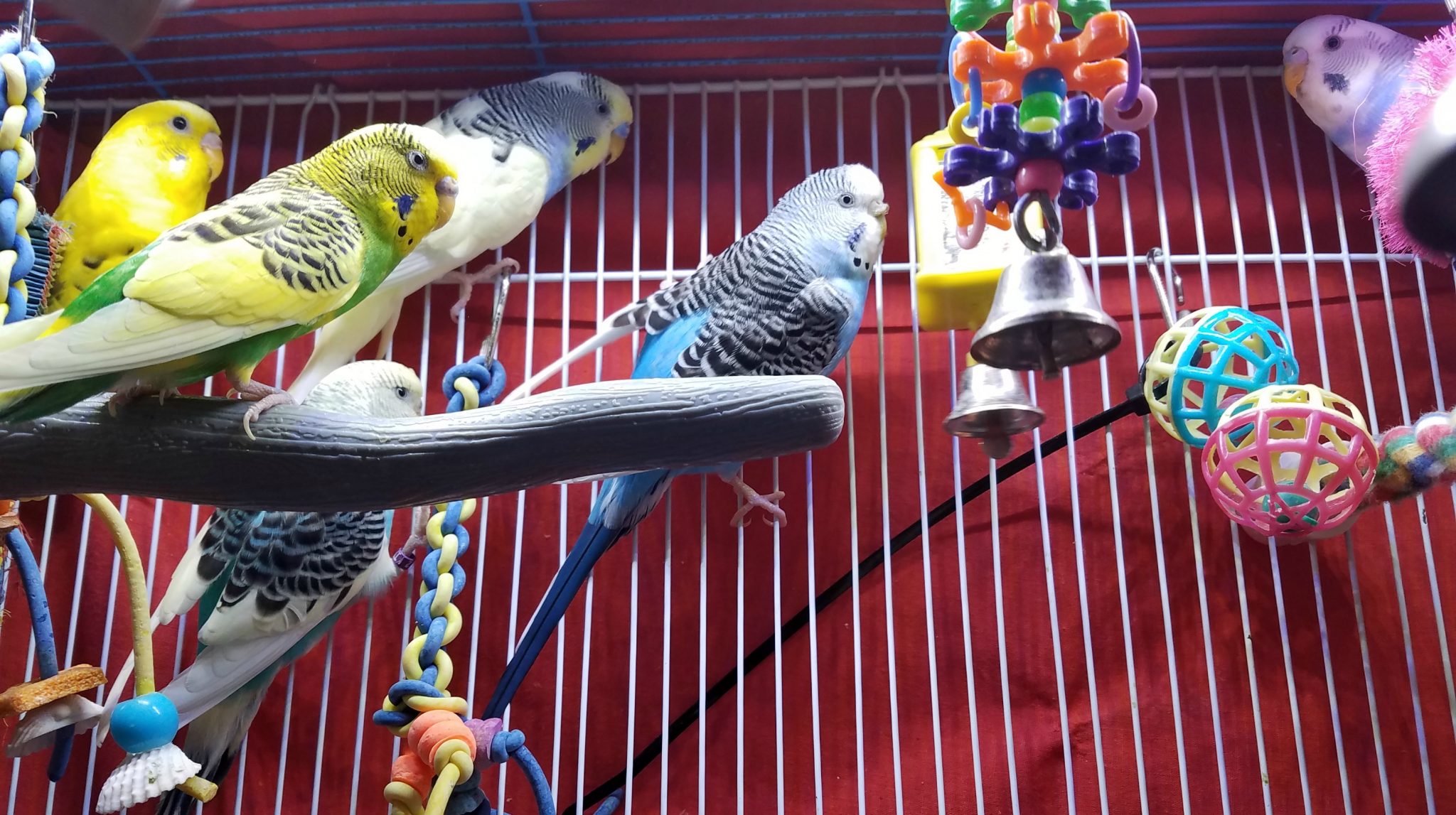Last Updated on by Mitch Rezman
I clearly have been remiss by not keeping everybody up with the lives of our six budgies.
Ever since we adopted the last two, Biscuit and Gravy, the dynamics have certainly once again changed in the cage environment.
Putting things in perspective there are only two males, Jam and Eggs, the other four are females.
Jam certainly takes charge on a regular basis. Eggs is just a mellow fellow.
Jam will “helicopter” and just stay afloat in the center of the cage “beaking” out orders.
It’s hard to say if everybody is listening and agreeing with him but he clearly is enjoying his swagger.
Biscuit, the bright yellow budgie also has begun to exhibit signs of feeling rather randy.
The other day I saw her with a small piece of millet spray (I cut them into pieces for easier sharing) in her beak with a destination in mind.
I wasn’t sure where but at some point she dropped the stems to the floor of the cage.
She too will helicopter in the cage during the day.
I can’t help but wonder if the empty millet stems were thought to be part of a nest building scheme.
We are careful within the cage to offer no obvious places to lay eggs in order to discouraging brooding activity.
We also keep the lighting above the cage set on a timer for 12 hours on and 12 hours off to keep them from becoming broody.
When we get home from the shop, Catherine has gotten into the habit of adding the lettuce and water baths, one on either side of the cage.
The birds seem to be more interested in the lettuce than bathing but with the two baths nobody seems to be getting crowded out of any water play opportunities.
Biscuit and Gravy who we acquired together, spend a little more time with each other than the others with Biscuit being a little bit aggressive to her forever cage mate, a bond that most definitely developed prior to their acquisition..
Biscuit will get a little pushy when they beak each other and Gravy will fly off for a minute but return for more beak smooches.
Eggs and Toast will be seen sharing a toy together regularly
Bacon is more the loner, having been the only wild caught (feral keet) but everybody seems to be interested in her, especially Jam.
The personality progression has been teaching.
In the beginning, there was Bacon who was given to us by a man that upon seeing the bird in a tree asked for a ladder and a net to try and catch it, and catch it he did.
Bacon was docile and finger tame from the beginning but after a week, Bacon had recovered enough energy to show us that she was a very wild bird.
If we let her out of the cage she would fly head first right into the window to get out.
We knew she needed a friend. So we acquired another parakeet, Eggs. The extra bird did help but we ended up with two twitchy budgies. To fix that we decided to get two more budgies.
We acquired a pair of keets from Jason Crean at a Bird Show who turned out to be Toast and Jam. This new addition really rounded out the cage. Bacon was finally able to relax and enjoy being in the cage with the other birds.
We noticed, that when Bacon was alone she ate fine, swung on a swing, didn’t play much, but when Eggs came in she was more open to trying different foods after seeing Eggs eat it.
Then when Toast and Jam were introduced, they were very interested in playing with the toys in the bird cage.
They previously ignored palm leaf toys but they now were being nibbled and some vine rings finally are being played with.
The Prevue Cal-Sea-Yum toy that had also been ignored now became a group favorite after Toast decided to remove the calcium stars that adorned it by slamming them into the cage bars breaking them off to better eat at the floor of the cage.
The four of them are good chewers, but nothing like they became when we added Biscuit and Gravy.
Biscuit and Gravy showed the gang how much fun and how easy it is to destroy a wood corner shelf within two days. After replacing the shelf two times in a week we now have a small metal shelf in that spot.
After adding the fifth and sixth parakeets, any toys that had been in there previously for a year now became debris at the bottom of the cage.
Wood toys were reduced to splinters.
We no longer have parakeets we have beavers.
Thanks for your advice! Just to clarify, are you saying that if I get only one friend for her, she’ll intensely bond to the other bird and stop wanting to be as close to me?
But if I get more than one friend then she won’t bond as intensely to the other members of her flock and may still want to interact with me?
My only concern with bringing more than one bird in with her is that they’ll gang up on her.
I guess that’s why having an even number is important.
Btw those budgies are beautiful – are they yours?
Yes they are ours – long story – we lost our tiel to cancer in June 2016 – Bacon found us – she must have been wild all summer and was then alone in the big cage.
Would not socialize and was clearly miserable.
We rescued Eggs thinking he was a she but we were wrong (take that Lou Reed) – they got along really well and we had a very nice big cage.
While at the national Caged Bird Show a few weeks back we were happily gifted Toast and Jam.
As long as we’re not in front of the cage the four of them have this “Honeymooner” (google it – old tv show) non stop chirp chirp chirp activity and all appear to be really happy leaving me to focus on my unnatural relationship with our recently rescued Senegal Peaches (profile pic) – win/win for birds & humans
Why are my two new budgies not mating?
mitchr’s answer on Quora
You say they are new budgies but do not indicate their age.
In another answer to this Quora question somebody mentioned (correctly) that budgies shouldn’t start breeding until six months to a year but even the upper end of that is considered very young.
Younger birds do not make good parents, let’s not rush things.
I would advocate light therapy.
Normally circadian rhythms guide a birds urges when to not only mate but when to molt and in many species when to migrate.
In the wild budgies typically mate in the spring and summer but our North American light cycles are confusing to your bird’s circadian clocks/rhythms.
I would introduce bright full spectrum lighting no higher than 6 inches above the bird cage and placed on a timer for 12 hours of light in 12 hours of darkness.
Make sure the budgies go to sleep in the cage and wake up in the cage so they know when the day begins and ends.
This new light cycle “may” be a motivating factor.
Light is very important because budgies decide on mates by the colors of the potential mates feathers, UV colors, colors humans cannot see.
The additional bright light might help give a signal to the female as the male emits these brilliant but invisible to us colors, that indicate “I’m the one for you”
We have six budgies two males and four females.
I watch them a lot and they all have sex with each other – whatever that infers.
Is it okay to open my budgies cage, so they can fly around?
Sure, and while you’re at it when your kid turned 16 just hand him or her the car keys tell them to “figure it out but be home by 10:30”.
There’s no doubt that your budgies know how to fly problem is a lack of navigation and landing skills.
People in this Quora thread have mentioned the basics about making sure doors are closed and windows are covered although I don’t think you necessarily have to pull drapes closed, there are other options.
We use a combination of stained-glass and beautiful fake orchid plants in front of all the windows as an example.
But many questions remain unanswered.
Where do you want your birds to land?
Where would you like to collect bird poop?.
If you do have curtains and your budgies land on the curtain rods it’s going to be little budgie bird poops decorating the house over time
Budgies can also be prolific chewers.
Any rattan furniture in your home could be dismembered, a small budgie could dismantle a rattan couch or room divider in a few weeks.
Instead of setting yourself up for failure, let’s make a plan.
If you bring a flighted bird in your home, and you want it to comfortably fly around your home, start with a wing clip.
We talk about the proper way to clip birds wings here.
This allows you to teach your bird about landing zones.
We don’t want landing zones to be crown molding that might be dirty and have anything from screws and nails to slivers the bird’s make while chewing it.
A landing zone on the birds cage can be a Booda Comfy rope perch attached to the cage top like an arch.
Some bird cages have landing doors that open up horizontally making landing easy.
What we don’t want is the bird flying into the front of the cage chest first and injuring itself.
With the proper wing clip the birds should “float” down slowly as it flaps its wings.
Start with tossing the bird towards the birdcage from one foot away so it knows that it can land “here”
Do this every day increasing the length relative to flight feather wing growth..
Find other places in the home where you have a bird stand that can become friendly and familiar.
Toss your budgie in the direction of each landing zone.
Repetition is the mother of learning – they’ll get it.
Landing zones allow anyone to have a bird close to them without being on them while the “home” birdcage is in another room.
Help the bird identify all the “landing zones”.
Make landing zones attractive as possible with treats and forging opportunities.
I don’t put water on any of Peaches our Senegal’s landing zones because she knows she can always fly back to her home cage to get water.
Conclusion: it’s not about teaching your birds how to fly, it’s about teaching them how to land.
What are the potential hazards to look out for, and protect your budgies from when you own pet budgies that are kept in an aviary or an indoor large cage?
Firstly, let’s address some of the issues mentioned below in the Quora thread.
Bar spacing is mentioned which is really less important than one would think but nobody ever talks about the other areas of a bird cage that a budgie could possibly escape from or get stuck in like sliding feeder doors so you want to look at the cage from every perspective.
Metal poisoning really doesn’t exist anymore and I’m a guy who’s sold, I don’t know 10,000 birdcages literally.
If you really want to ensure that your birdcage is deficient in any toxicity you will have to scrape away the powder coating and then scrape some metal from the cage itself and send it off to a laboratory for analysis.
The big name brand manufacturers today like Prevue Pet, HQ an AE have far too much tertiary liability selling to large chains having huge websites to be naïve about building bird cages with unsafe metals.
If your bird can escape the cage, especially budgies – get a new cage.
A bird should not escape from a well-designed cage and they can easily defeat twist ties.
If you have brooding hens they should not be placed in or near cages with other brooding hens.
That’s just common sense.
Because the question is about aviaries and cages I’m going to stick to the subject and not venture off about things like hundreds of household items that can be dangerous and Teflon that is in more things than you can ever imagine like hairdryers, waffle makers and simple baking sheets – but I digress.
You want to look at your cage every day and make sure it’s safe.
If you use a cable tie to attach a toy that has fallen off a pear link make sure the cable tie is cinched up tightly so the birds head nor body can’t get stuck in it.
It’s important to remember that everything inside your budgies cage is 100% organic and subject to change. What is safe today is not necessarily safe tomorrow. Any and every item in a cage can be dangerous to your birds if not placed or used correctly.
If you don’t have covers over the water, you will get poop water which can lead to bacterial infections of the mouth which can get very costly at the vet – done that been there.
Have a question about your budgie? Reach out here.
Author Profile
Latest entries
 Feeding Exotic BirdsDecember 29, 2025How to Switch or Convert Your Bird From Seeds to Pellets: Real-Life Case Studies and Practical Guidance
Feeding Exotic BirdsDecember 29, 2025How to Switch or Convert Your Bird From Seeds to Pellets: Real-Life Case Studies and Practical Guidance Feeding Exotic BirdsDecember 16, 2025A Practical, Budget-Smart Guide to Feeding Birds Well
Feeding Exotic BirdsDecember 16, 2025A Practical, Budget-Smart Guide to Feeding Birds Well Bird EnviornmentsDecember 7, 2025Understanding Budgie Cage Bar Orientation: Myths, Realities & Practical Solutions for Vertical-Bar Bird Cages
Bird EnviornmentsDecember 7, 2025Understanding Budgie Cage Bar Orientation: Myths, Realities & Practical Solutions for Vertical-Bar Bird Cages Feeding Exotic BirdsDecember 5, 2025How Dr. T.J. Lafeber Rewrote the Future of Pet Bird Nutrition
Feeding Exotic BirdsDecember 5, 2025How Dr. T.J. Lafeber Rewrote the Future of Pet Bird Nutrition




